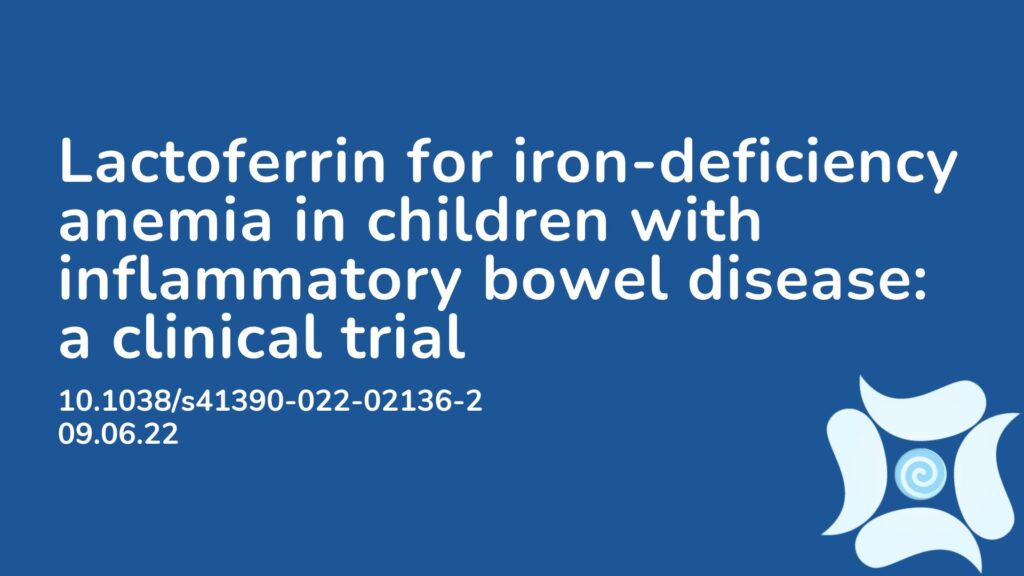Summary: For children with inflammatory bowel disease (IBD), iron-deficiency anemia is considered the most common complication and it impacts neurodevelopment, quality of life and physical growth. Iron-deficiency anemia in IBD is also correlated with gastrointestinal bleeding, mucosal inflammation and decreased iron absorption. Inadequate iron intake can sometimes be due to dietary restriction that is necessary to manage symptoms of IBD, as well as poor appetite. Iron deficiency anemia in children is commonly treated with oral and intravenous iron, however, children are historically found to be non compliant with oral iron supplements due to associated abdominal pain and nausea. Several studies have compared the efficacy of iron supplementation, including lactoferrin in neonates and has found that it is effective with little to no gastrointestinal side effects. Lactoferrin is an iron-binding glycoprotein that has shown to modulate inflammation, immunity and improve iron absorption. Lactoferrin has also been documented as an effective therapy in the treatment of iron-deficiency anemia in both adults and paediatrics, however the role of lactoferrin in the treatment of IBD-related iron-deficiency anemia has not been examined. Therefore, the aim of this randomised controlled trial was to analyse the efficacy of lactoferrin compared with oral ferrous sulfate in the treatment of iron-deficiency anemia in children with IBD. This study was conducted on children with IBD-related iron-deficiency anemia. 46 children with IBD as well as iron-deficiency anemia received ferrous sulfate in a dose of 6 mg/kg/day for 3 months and 46 children also with IBD and iron-deficiency anemia received bovine lactoferrin at a dose of 100 mg/day for 3 months. Lactoferrin significantly increased hemoglobin, serum iron, transferrin saturation and serum ferritin compared to ferrous sulfate, with fewer side effects. Lactoferrin also enhances the uptake of iron. A finding such as this is of pivotal importance, given that compliance to iron supplementation in children is so low, yet the impact of iron-deficiency anemia is so catastrophic to human health.
Abstract:
Background: Iron-deficiency anemia (IDA) is common in children with inflammatory bowel disease (IBD); however, oral iron supplements are commonly associated with poor compliance due to gastrointestinal side effects. We compared the effect of lactoferrin versus oral ferrous sulfate for the treatment of IDA in children with IBD.
Methods: Ninety-two IBD children with IDA were included but only 80 children completed the study and they were randomized into two groups: ferrous sulfate group (n = 40) who received ferrous sulfate 6 mg/kg/day for 3 months and lactoferrin group (n = 40) who received lactoferrin 100 mg/day for 3 months. Complete blood count, serum iron, total iron-binding capacity (TIBC), transferrin saturation (TS), serum ferritin, interleukin-6 (IL-6), and hepcidin 25 were measured before and after the treatment.
Results: Hemoglobin (Hb), mean corpuscular volume, serum iron, TS, and serum ferritin significantly increased, while TIBC decreased significantly after the administration of either ferrous sulfate or lactoferrin compared to their baseline data. In addition, lactoferrin significantly increased Hb, serum iron, TS, and serum ferritin compared to ferrous sulfate. Moreover, lactoferrin significantly decreased IL-6 and hepcidin levels.
Conclusion: Lactoferrin is a promising effective treatment with fewer side effects than oral elemental iron in children with IBD and IDA.
Article Publication Date: 09.06.22
DOI: 10.1038/s41390-022-02136-2



